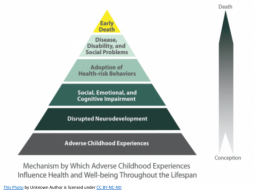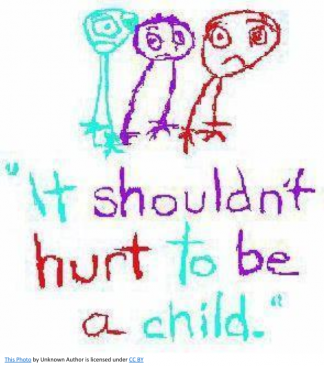 By David R. Shorey, East County Program Manager, Institute for Public Strategies
By David R. Shorey, East County Program Manager, Institute for Public Strategies
August 31, 2020 (San Diego’s East County) -- One of the lessons the past six months have taught us is that stress, trauma, and the environment that we are in can have significant emotional, psychological and physical impacts on us. Adults will often talk about the resiliency of kids in dealing with stress and trauma, but the reality is that certain childhood experiences lay the foundation for a lifetime of struggles on a person. For our East County kids to grow up to be healthy adults with long life expectancy, the first thing we need to do is eliminate or at least minimize their adverse childhood experiences (ACEs).

ACEs include emotional, physical or sexual abuse; emotional or physical neglect; witnessing domestic violence; parental separation or divorce; substance abuse and/or mental illness of anyone in the household; or incarceration of someone in the home.
 The Center for Disease Control and Prevention and Kaiser Permanente collaborated on an ACEs study in the mid-1990s in Southern California, surveying more than 17,000 adults. It was one of the largest investigations of childhood abuse, neglect, household challenges and later-life health and well-being. The data was collected from San Diego area Kaiser patients receiving physical exams who completed confidential surveys regarding their childhood experiences during their first 18 years of life and current health status and behaviors.
The Center for Disease Control and Prevention and Kaiser Permanente collaborated on an ACEs study in the mid-1990s in Southern California, surveying more than 17,000 adults. It was one of the largest investigations of childhood abuse, neglect, household challenges and later-life health and well-being. The data was collected from San Diego area Kaiser patients receiving physical exams who completed confidential surveys regarding their childhood experiences during their first 18 years of life and current health status and behaviors.
 Results of the survey showed that ACEs are common, interrelated and found in all socio-economic backgrounds. Depending on which of the 10 known ACEs a respondent experienced, determined the health trajectory of their lives. The more ACEs experienced or higher score in the study, the more risk for health challenges as an adult.
Results of the survey showed that ACEs are common, interrelated and found in all socio-economic backgrounds. Depending on which of the 10 known ACEs a respondent experienced, determined the health trajectory of their lives. The more ACEs experienced or higher score in the study, the more risk for health challenges as an adult.
It’s like comparing it to a hiker carrying a backpack. The more weight in the backpack, the fewer miles the hiker is able to hike. Chances are that if someone has at least one ACE, they likely have two or more.
ACEs lead to an increase in chronic health problems like cardiovascular disease, cancer, diabetes, asthma, liver disease, etc. While asthma comes sooner in life, cardiovascular problems come later in life. A high ACEs score typically means the individual will likely drink alcohol sooner in life and become more susceptible to alcoholism and drug use. They are more likely to engage in unsafe sex, have unplanned pregnancy, smoke cigarettes, become obese and depressed.
The opposite of ACEs are positive childhood experiences, known as protective factors. Some of those include knowing they can talk with family about their feelings; having a family that stood by them during difficult times; enjoying community traditions; feeling a sense of belonging in high school; feeling supported by friends; having at least two non-parent adults who took a genuine interest in them; and feeling safe and protected by an adult in their home. Studies show having just one adult for a child to connect with can lessen the traumatic effect of ACEs.
Addressing ACEs doesn’t end with focusing just on kids. Adults who become aware of the impact that adverse childhood experiences have had on their development can take significant steps to end the cycle with their own kids. Reviewing and identifying how ACEs have had an impact is not a sign of weakness nor an exercise in futility. It is an act of empowerment. It is also an act that can have long-term positive emotional and psychological impact on those who do it.
More information about testing for ACEs, treatment, healing and other help can be found at the ACEs Aware website, an initiative lead by the Office of the California Surgeon General and the Department of Health Care Services. You can check your ACEs score, get an online assessment of your resilience and other related articles at ACEsTooHigh.com. Live Well at Home is a free resource to help the community find tips and strategies to stay healthy in both mind and body.












Recent comments